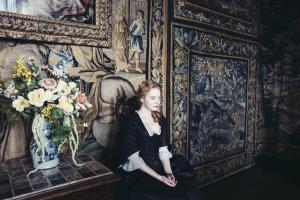By Christian Hamaker
Ahead of the 2018 Middleburg Film Festival’s closing screening of Green Book, that film’s director, Peter Farrelly, told a packed house that Middleburg had become recognized “overnight” as one of the world’s premier film festivals. The audience, which applauded appreciatively, boisterously repaid the filmmaker’s compliment later by leaping to its feet at the closing credits, eager to affirm their affection for a film that had just solidified its place, early in the film-awards season, as the Best Picture frontrunner.
The festival, born in 2013 by Sheila Johnson, has quickly established itself as an East Coast Sundance (Robert Redford, who founded the Sundance Film Festival in Colorado, inspired the idea of a festival built around Johnson’s Salamander Resort and Spa in Middleburg). From its founding, Middleburg has attracted major awards contenders and talent, including performers last year from The Darkest Hour and Lady Bird, and Green Book’s Viggo Mortensen this year. But it’s not only North American releases that are showcased in Middleburg; festival programmers have consistently found a place for official Oscar submissions from countries across the globe, while making space for a few offbeat mindbenders among the high-toned prestige dramas.
My Middleburg slate this year comprised nine films (you can read my previous wrap-ups of the festival from 2017, 2016 and 2015) across those categories, starting with a Melissa McCarthy comedy/drama and ending with a black-and-white Polish film from the director of Ida—one of the 21st century’s great spiritual films.
While religious themes weren’t overt among the films I screened this year, several Middleburg titles focused on the toll exacted by the fracturing of families and marriages. Here’s a recap of each film, in the order I saw them.
Can You Ever Forgive Me?
Melissa McCarthy stars as writer Lee Israel, a best-selling biographer who, fallen on hard times in the early 1990s, begins forging letters from prominent writers of an earlier era (Dorothy Parker and Noel Coward among them) and selling the fake epistles to memorabilia collectors. Her friend Jack Hock (Richard E. Grant) becomes her accomplice in the fraud.
McCarthy is getting awards traction for her first dramatic performance, but Can You Ever Forgive Me? is far from a straight drama or standard biopic. Touching at times—and intriguing not only as a study of financial desperation but of loneliness and, to some extent, the costs of isolation—the film includes more laughter than many films billed as comedies, particularly when Grant is on-screen. Indeed, the attention McCarthy is receiving for playing against type, while deserved, is secondary to the scene-stealing Grant. Rounding out a strong ensemble is Dolly Wells as Anna, a bookstore owner whose interest in Israel isn’t strictly platonic. The story’s matter-of-fact treatment of the adjustment of Israel, a loner—“I always need a drinking buddy,” Lee tells Anna as they’re getting to know each other—to the interest from Wells, as well as her care for Jack, a gay man, could signal an agenda-driven film, but Can You Ever Forgive Me? never feels like a message-driven drama. Instead, it’s a well performed story about the human capacity for deception (self- and otherwise).
Shoplifters
From the great Japanese director Hirokazu Kore-eda, the winner of this year’s Palme d’Or at the Cannes Film Festival is the story of a family pieced together in a most unusual way.
Three generations live together, drawing on grandmom’s pension and dad’s job as a construction worker. A daughter performs erotic acts at a gentlemen’s club, while the younger kids shoplift from the grocery store and steal from local merchants. When the father suffers a workplace injury, the group becomes even more reliant on the children’s thievery.
But what seems on the surface like a struggling family is something different, as tipped in the opening scenes, when the youngest member of the clan is found hiding outside by the father and son. Clearly a victim of emotional abuse (we hear her guardians arguing over who her biological father might be), they take her in, convincing themselves that they aren’t kidnapping her. Gradually we learn that other family members aren’t blood relatives, and the story shifts from the sort of subtle observational drama Kore-eda is best known for to a crime procedural in which character relationships are explained. The change in story emphasis here—more reminiscent of Kore-eda’s recent, less appreciated The Third Murder—is surprisingly satisfying, providing resolution and tension to a film that has been leisurely paced even as its mysterious elements mount. Shoplifters is both a summation of the filmmaker’s dominant themes across a body of work, and a sign that he could be moving in a new, but still effective, direction.
Ruben Brandt, Collector
“In my dreams I was two cats and I was playing with each other,” reads opening text over the animated Ruben Brandt, Collector. The riddle conjures an image both playful and cerebral. Unfortunately, it’s all downhill from there. Easily the least effective of the films I saw at Middleburg, this Hungarian animated patchwork of references to great artists and some of their well-known work is an exhausting, repetitive head trip.
A psychotherapist, plagued by nightmares, embarks on a series of thefts of great works of art, hoping to be freed of his night-time terrors. An unending litany of visual references and tiresome heists ensues, but what might have made for a bracing animated short stretches out to more than 90 excruciating minutes. A plot device key to unlocking the story’s central mystery involves clues hidden within still frames on celluloid, but by the time that nugget emerges, even film buffs will have lost interest.
Border
From the worst film I saw at Middleburg to possibly the best: Border is a genre-bending surprise that appealed to my taste for the fantastic. Tina (Eva Melandor) works as a customs agent, identifying more than just illegal items. She tells a co-worker that she can sense thing like guilt and rage—an animalistic talent that pays off time and again by exposing evil intentions and criminal behavior. When Vore (Eero Milonoff), who shares similar physical characteristics to Tina, is detained, the two enter into a relationship that creates a rift between Tina and her live-in boyfriend, Roland (Jorgen Thorsson). A shared secret sends Border into the realm of fairy tale (one with some explicit sexual content), with both moments of lightness and a darker turn that explores depravity, human nature and the possibility of goodness.
Happy as Lazarro
Alice Rohrwacher’s fable about a group of Italian tobacco-plantation sharecroppers includes Lazarro (Adriano Tardiolo), a Holy Fool who befriends Tancredi (Luca Chikovani), a rascal whose treatment of the naïve Lazarro may be as exploitative as the field workers’ unjust situation.
A surprise plot development bends the story’s timeline in surprising ways, leading to Lazarro reconnecting with long lost friends and shedding grace upon those in need of it. But there’s frustratingly little of substance to Lazarro’s tale and to its more supernatural elements. The story’s spirituality is vague, and it’s tied to a class-consciousness that, while never subtle, becomes unbearably heavy-handed during the film’s misguided, tonally distinct finale.
The Favourite
As I told others after seeing the latest film from Yorgos Lanthimos (Dogtooth, The Lobster, Killing of a Secret Deer), I don’t know if I’ve liked any of his films—he’s widely considered a misanthrope, and his earlier stories are sexually explicit and very dark—but I can’t take my eyes off them. My inner auteurist yields to the man’s mise-en-scene and employment of the Steadicam.
Lanthimos has at last found a mainstream story to marry to his style—a British period piece. Set during the reign of Queen Anne (Olivia Colman), The Favourite explores wartime politics (Britain and France in the early 18th century) through a power struggle among three women: Anne, her longtime friend Sarah Churchill (Rachel Weisz) and Sarah’s cousin, Abigail Masham (Emma Stone). As Sarah spends more time planning war strategy, Abigail wrestles away Sarah’s role as the queen’s main confidante. Sexual favors are key to the machinations—the film doesn’t shy away from depicting the erotic dimension of these relationships.

What could have been a stately costume drama is, instead, an energetic work of swish pans, tracking shots and crazy camera angles. The Favourite may find Lanthimos’ widest audience yet, appealing to the Downton Abbey crowd (some of whom will be at least mildly scandalized—by the dialogue as well as the characters’ actions) as well as to fans of Lanthimos’ earlier films. “The story is about how complicated love is, and how who you are as a person can be perverted and deformed by those complications,” said screenwriter Tony McNamara in the film’s press notes. You may take away a similar message from The Favourite, perhaps for different reasons or from a different set of premises about human nature. There’s little, if any, redemption here, but the exploration of the darker side of human behavior makes for Lanthimos’ most accessible film yet.
Capernaum
Nadine Labaki’s Lebanese drama about children’s rights—winner of the Jury Prize at this year’s Cannes Film Festival—starts on the wrong foot and never rights itself. In a tiresome framing device, we meet Zain (Zain Al Rafeea), a 12-year-old boy suing his parents because of the parade of misery depicted during the rest of the film’s running time: a sister given to the family’s much older landlord, a young boy Zain must care for when the boy’s mother is detained, and the disregard of his mother and father for Zain’s well-being.
As with Holy Fool characters (Happy as Lazarro), I’ve had my fill of scrappy kids triumphing against a cruel world, but I’d rather sit through warm-hearted crowd pleasers like Slumdog Millionaire and Lion again before enduring a second viewing of Capernaum, which is profoundly anti-parent and even anti-birth. I’d be more concerned about what messages viewers might take away from Capernaum had the film’s relentless misery not smothered me early on, leaving me trying to forget about it altogether.
Green Book
A huge crowd-pleaser, Green Book refers to a guide for lodging for black Americans traveling in the Southern United States in the early 1960s. Dr. Don Shirley (Mehershala Ali), a renowned black pianist, employs an Italian-American bouncer from the Bronx, Tony Lip (Viggo Mortensen), as his driver during a tour of the segregated South. The expected run-ins with locals appear like clockwork, as do multiple scenes of the two men being pulled over by the police. Gay-bashing is added to the expected depictions of racism, but the chemistry between the leads offsets the story’s clichés. The script, from Farrelly and two other writers, includes one of the great kickers, ending this enjoyable, if elementary, morality lesson on a huge high.
Cold War
Pawel Pawlikowski (Ida) directs another black-and-white period piece, not about a nun this time but about a long-running romance. Zula (Joanna Kulig) and Wictor (Tomasz Kot) meet—she’s a singer, he’s a pianist—fall in love, and struggle to stay connected in a story that crosses Poland, Berlin, Paris and Yugoslavia during the late 1940s and 1950s. Beautifully filmed and full of music—choral, instrumental jazz, torch songs—Cold War rises or falls on the chemistry between its leads. Like Bruce Weber’s Chet Baker documentary Let’s Get Lost, Cold War is a swooning, music-driven reverie that sometimes feels more like an object to behold than an absorbing drama, but when it works, the tune is hard to shake.









